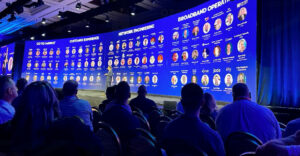
The research arm of Microsoft already had an international reach; now, the company is tapping into the scientific prestige of the U.S. East Coast.
The Redmond, Wash.-based software giant will open its first research lab in the region — in Cambridge, Mass. — in July.
Microsoft Research New England will build on the company’s commitment to collaborate with scientists in its quest for gains in computing research, Microsoft said.
The new lab — the sixth for Microsoft Research, which was launched in 1991 — will bring together computer scientists across various disciplines. It also will create an opportunity for Microsoft to interface with faculty and students at institutions in the region, such as MIT and Harvard.
Tapping Into Cambridge’s Talent Base
“Every time the doors of a new basic research facility open, new avenues for research, collaboration and innovation also open up,” said Rick Rashid, senior vice president of Microsoft Research. “Microsoft Research New England will create additional opportunities for researchers to pursue their passions in the Cambridge area, one of the world’s foremost centers of innovation, setting the stage for new discoveries and scientific breakthroughs,” he added.
“Microsoft Research has always been given permission to go wherever really good talent is,” Greg DeMichillie, lead analyst at Directions on Microsoft, told TechNewsWorld. “MIT and Harvard are certainly fantastic institutions to work with. It doesn’t strike me as surprising. They probably had a really good professor or two at each they wanted to work with.”
Microsoft researcher Jennifer Tour Chayes will manage the new lab. Chayes, a specialist in mathematics, theoretical computer science and cryptography, has been with Microsoft Research since 1997. Chayes is coinventor of more than 20 patents and has authored nearly 100 scientific papers.
“Breaking through barriers is what research is all about,” she said. “We’re going to New England to break through barriers between core computer science and social sciences and to do fundamental research that can lead to deeper insights and better computing experiences in an increasingly online world.”
A Pragmatic Move
It’s also a practical segue into some of the sharpest computing minds in the country, DeMichillie said.”This is a good way to get Microsoft involved in the academic community in the advancing the state of computer science. At the same time, they want to have an inside track on connecting that research into products down the line.”
Other Microsoft Research labs are located in California’s Silicon Valley; Cambridge, England; Beijing; Bangalore, India; and Redmond.
The new center represents a continuing commitment to investing in basic research at a time of corporate and governmental cutbacks in the area of research, Microsoft said.
“If Microsoft seeks to make its future in the highly dynamic world that it has to survive in, it has to reach out to as many different types of potential researchers as possible,” Whit Andrews, research vice president with Gartner, told TechNewsWorld. “I would assume, based on their offer for Yahoo and their excitement around software service, you’re going to see Microsoft reach into areas where it hasn’t been a major force. Look for them also to try to understand media in ways they previously hadn’t done.”
A Key to the Company’s Future
Working with tech-savvy students at MIT and Harvard won’t hurt the company’s recruitment efforts, either, Laura DiDio, a research fellow with Yankee Group, told TechNewsWorld.
“Massachusetts is so university-heavy, within striking distance of some prestigious institutions,” DiDio said. “If you’re Microsoft, you want to be able to recruit these people but also tap into their knowledge base. But you also want to evangelize for Microsoft. It’s not the only step they have to make, by far, but you do want to get the hearts and minds of the young people.”




















































